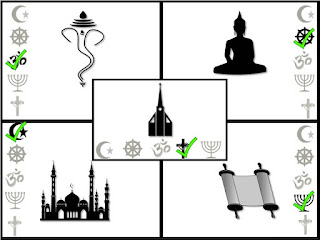Mithras,
Osiris, Horus, Dionysus, Adonis, Attis, Demeter, Persephone, Aphrodite, Isis,
Danae, Melanippe [and who knows how many more], are some of the deities claimed
to be the source for the Christian miracle narratives. The virgin birth,
sacrificial death, crucifixion, resurrection, etc. have been attributed to these
deities. Hence, some skeptics claim that Christianity is false since it has copied
the miracle narratives from the pre-christian deities/religions.
But please
note that no serious academic scholar/historian from any credible academic
institution confer any credence to this accusation against Historic
Christianity. This accusation is absolutely baseless and outdated, but still it
makes its rounds in social media as and when appropriate.
Here is a
few reasons why this accusation is without any credible foundation:
1. Dr.
William Lane Craig dismisses these accusations based on the lack of serious scholarship, “When they
say that Christian beliefs about Jesus are derived from pagan mythology, I
think you should laugh. Then look at them wide-eyed and with a big grin, and
exclaim, "Do you really believe that?" Act as though you've just met
a flat earther or Roswell conspirator. You could say something like, "Man,
those old theories have been dead for over a hundred years! Where are you
getting this stuff?" Tell them this is just sensationalist junk, not
serious scholarship. If they persist, then ask them to show you the actual
passages narrating the supposed parallel. They're the ones who are swimming
against the scholarly consensus, so make them work hard to save their religion.
I think you'll find that they've never even read the primary sources.”1
2. Dr. Mark
Foreman questions the causal influence of the parallels. Even if there were
parallels, there is no good evidence to
ascertain that these parallels
influenced the Historic Christian worldview. He emphasizes that Judaism,
which is an extremely exclusive monotheistic religion, would not have tolerated
the syncretism of the mystery religions. Moreover, the earliest Christians, who
were primarily Jews, were even more exclusivistic. Hence, they would not have
imported any stories from the mystery religions.2
3. Greg
Koukl encourages Christians and honest seekers to primarily examine the
credibility of the Historic Christian narrative. He says, “Those myths are
only valuable if you first determine that Jesus is a fiction by looking at the
primary source historical documentation. If you look at the historical record
and decide that it is unreliable, if you first conclude that there is no good
reason to believe that Jesus of Nazareth existed the way the Biblical records
say He did, then it might then, and only then be useful to ask the question:
How did this story come to be?”3 He also states that the primary source documentation is highly
credible for Historic Christianity than the mystery religions.4
4. Sean
Mcdowell in an article entitled “Is Christianity a Copycat Religion?”
emphasizes that the differences between
Christianity and the mystery religions are more profound than the alleged
similarities. He also asserts that the parallels
prove nothing, and the chronology is
all wrong.5
These
reasons are sufficient to dismiss these accusations against Historic
Christianity.
Last but not
the least, even non-christian scholars
reject these accusations:6
Dr. Tryggve Mettinger (a Swedish professor at Lund
University) has written the most comprehensive account of the dying and rising
god motif. He himself affirms the concept of “dying and rising gods.”[3] Yet he
concedes that he is in the strict minority: “There is now what amounts to a scholarly consensus against the
appropriateness of the concept [of dying and rising gods]. Those who still
think differently are looked upon as
residual members of an almost extinct species… Major scholars in the fields
of comparative religion and the Bible find
the idea of dying and rising deities suspect or untenable.”[4] For
instance, Jonathan Z. Smith (historian from the University of Chicago) writes,
“All the deities that have been identified as belonging to the class of dying
and rising deities can be subsumed under the two larger classes of disappearing
deities or dying deities. In the first case, the deities return but have not
died; in the second case, the gods die but do not return.”[5]
Skeptic Matt Dillahunty (of Atheist Experience) writes, “The
first third of the film (Zeitgeist) is an unscholarly,
sophomoric, horribly flawed, over-simplification that tries to portray
Christianity as nothing more than the next incarnation of the astrologically
themed religions that preceded it. Like all conspiracy theories, they combine a few facts, focus on correlations
and build an intriguing story that seems to fit the pieces together
nicely—provided you don’t actually dig below the surface to find out where they
might have gone wrong.”
In describing the German higher
critical school which gave birth to this entire theory (Religiongeschichtliche
Schule), critical scholar Maurice Casey
writes that this is “now regarded as out of date” and “significantly mistaken.”[6]
Regarding the Cross and Atonement,
atheistic critical scholar Bart Ehrman
writes, “Where do any of the ancient sources speak of a divine man who was
crucified as an atonement for sin? So
far as I know, there are no parallels to the central Christian claim. What
has been invented here is not the Christian Jesus but the mythicist claims
about Jesus… The majority of scholars
agree… there is no unambiguous evidence that any pagans prior to Christianity
believed in dying and rising gods.”[7] He adds, “None of this
literature is written by scholars trained in the New Testament.”[8]
So whenever
you come across an accusation that Historic Christianity is a copycat religion,
you can wholeheartedly pay no attention to the accusation, for it is tenuous,
asinine, and sophomoric.
Endnotes:
1https://www.reasonablefaith.org/writings/question-answer/jesus-and-pagan-mythology/
2http://christianapologeticsalliance.com/2017/03/12/did-christianity-copy-from-paganism-part-2-no-causal-influence/
3https://www.str.org/w/the-zeitgeist-movie-other-myth-claims-about-jesus#.UcbtoT772vE
4Ibid.
5https://www.apologeticsbible.com/wp-content/uploads/2017/07/Is-Christianity-A-Copycat-Religion_.pdf
6http://christianapologeticsalliance.com/2017/02/10/did-christianity-copy-from-paganism-part-1/#_ftn4
Websites last accessed on 19th July 2021.


